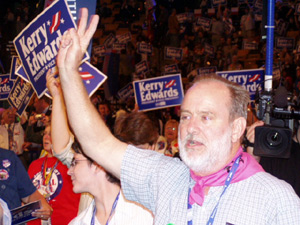Audio
Photos
Your Voice
| |||||||||||||||||||||||||||||||||||
Minnesota DFLers united despite differences
July 28, 2004
Democrats in Boston have approved a new platform that more than doubles the space given to defense and foreign policy issues. It also touches on the controversial issues of abortion rights and gay and lesbian unions. But despite the tangle of thorny issues, Minnesota delegates say they are unified behind Sens. John Kerry and John Edwards in a way that they haven't been in recent years.
Boston, Mass. — As a convenience for those who may have missed the discussion of the 37-page Democratic platform, we present the floor debate here in its entirety.
PODIUM: Hearing none, the chair calls the question. All those in favor say "aye."
CONVENTION: Aye!
PODIUM: All opposed?
 | |||
A hush falls across the crowd.
PODIUM:The ayes have it. The report of the platform committee is hereby adopted. Thank you very much.
In other times, party conventions often included rowdy, divisive, and lengthy platform fights. But that hasn't been the case for years.
Ken Kelash was a Minnesota member of this year's platform committee, which labored for months prior to the convention to draft a document that bridged important differences.
Supporters of Ohio Rep. Dennis Kucinich's presidential bid, for example, had argued for tough langauge on the war in Iraq and a specific plan for withdrawing U.S. troops. As an accomodation, the platform complains that President George W. Bush "rushed to war," but stops short of calling the invasion a mistake.
|
The platform doesn't go anywhere near as far I'd like it to. But I think that's part of the deal of a political party. You don't always like all the points. You pick your limits, how far you can go. This is my party. What can I say?
- Delegate Charles Underwood |
And rather than offer a timetable for ending the U.S. military presence, it more vaguely suggests that Democrats reduce troop levels "when appropriate." Kelash says defining the party's intention -- rather than spelling out concrete actions -- was an important compromise.
"That may be a subtle difference, but I think it's a politically smart way to do it," says Kelash. "Plus, I think it's also -- you're promising something you're actually going to be doing. You're going to be able to go in a direction. You're not necessarily going to get everywhere you want to go, but you're going in a direction."
Delegate Charles Underwood says he still intends to support Kucinich Thursday night when the party nominates its presidential candidate. Speaking on the convention floor, the St. Paul school teacher says he's disappointed the platform didn't take a stronger position against the Iraq invasion.
"The platform doesn't go anywhere near as far I'd like it to," Underwood says. "But I think that's part of the deal of a political party. You don't always like all the points. You pick your limits, how far you can go. This is my party. What can I say?"
Underwood says he has no doubt Kerry would be more attentive to his concerns than Bush -- and that's the prevailing attitude of Minnesota delegates across a broad spectrum of issues.
Even opponents of abortion say they can find common ground with the Kerry-Edwards ticket, despite the candidates' clear support for legal abortion.
State Rep. Mary Ellen Otremba of Long Prairie has consistently opposed abortion during her legislative career, and she spoke to a streetside rally organized by the group Democrats for Life outside Boston's Faneuil Hall.
Although the platform clearly protects abortion rights, Otremba say the document's committment to economic issues will nonetheless help women find financial stability, stopping many of them from choosing abortion in the first place.
 | |||
"It may be the unborn baby that they're willing to abort," Otremba says. "But as far as health care and handicapped and education and livable wage and death penalty -- those are all pieces that we agree on."
Otremba also opposes same-sex marriage -- which puts her at odds with another platform plank that rejects a federal constitutional ban on gay marriage.
But gay and lesbian delegates say that's no reason the two sides of the debate can't work together on other issues.
Back in the convention hall, delegate Megan Thomas, a board member for the National Stonewall Democrats, which supports gay and lesbian rights, says she and others can't afford to be distracted by single issues.
"I have what I call the gay pothole theory," Thomas says. "Even though I'm gay, the potholes I hit aren't gay. I still need them to be filled, and I still need the air to be clean. When I wake up in the morning right now, I'm unemployed. That's a little bit more important to me sometimes."
Thomas says delegates are unified, thanks to an intense desire to unseat Bush. It may be the only thanks the president receives all week.
|
News Headlines
|
Related Subjects
|


